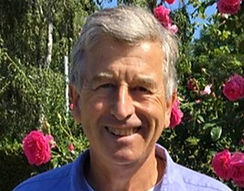Helping Sustain our Village Community + Working Creatively to Tackle the Challenge of Climate Change
Lockdown Life
A series of interviews with villagers in lockdown by Frances Currey
3: Andrew Trotman

to-face coaching and work from home, over the internet. This has made him realise the amount of time he used to spend travelling.
Andrew appreciates the fact that lockdown has occurred during such a beautiful time of year. He and his wife take long walks and with the improved air quality and with fewer cars on the road they have loved looking across the fields towards Coventry.
Andrew has been busy; contacting old friends, playing guitar, making pottery, and even experiencing a virtual mountaineering trip in the French Alps.
On the negative side, Andrew realises that others have not been so lucky. He feels deeply sorry for all those who have been put under severe lockdown measures. He is acutely aware that the forty-thousand deaths have caused huge amounts of pain for all the families and friends affected.
On a personal level Andrew and Mary are missing their two grown up children. They have been separated since lockdown and were unable to get together on Mothering Sunday. They have been chatting on the telephone and on “Zoom” but this is no replacement for seeing the kids in person.
I asked Andrew for his opinion on the recent lifting of the lockdown measures. He agrees that the economy needs to get moving. The more the economy crashes, the more people will die. Peoples’ futures are at stake as well as the NHS, the arts and small businesses.
He has sensed a lot of tension between political decisions and scientific advice. Scientific research and statistical analysis takes time, time we don’t really have.
The pressure of twenty-four-hour news coverage, which constantly showcases people’s concerns and opinions, makes every decision difficult. This said, Andrew believes it is time to start returning to normal life.
I wanted to get an educationalist’s take on pupils returning to school and how important this was. He knows that children need to be in school. He believes that education is not just about learning facts. It allows students to work in teams and teaches them how to carry out research. It’s how young people adapt their knowledge as they move into adulthood. Although many parents are doing a fantastic job of home-schooling Andrew believes that there is no real alternative to schools.
On line learning has proved an essential tool during lockdown and the importance of these platforms now means that schools must invest more in that type of learning. He wants to congratulate all the teachers and support staff who have been committed to helping students through this confusing time. He hopes students have managed to stay motivated while working from home.
Andrew volunteers for the “Winston Churchill Memorial Trust” which funds several research initiatives into social isolation and online learning all around the world.
Lastly, I asked Andrew about the impact he thought the lockdown would have on the world of arts and culture.
Although he has been enjoying online Theatre performances, he is convinced society thrives on live theatre and music. As well as boosting the tourist industry our culture brings people together and he fears it will take a while to get back to how things were before the pandemic.
When it comes to the issue of climate change, he hopes that the big changes made post-COVID 19 will have a positive impact on the environment.
Andrew believes that the world is going to change. He thinks plans need to be put in place to prevent events like this happening again. He believes we don’t have to go back to the world we lived in before, he hopes we can move forward to a better world.
Thank you for reading this latest interview.
There will be another in two weeks.
Keep safe and sensible.
Best wishes, Frances Currey.
Andrew Trotman and his wife, Mary, moved to Ilmington in 2011 and immediately fell in love with the village.
After teaching for 35 years and 18 as a head teacher, Andrew went back to university to re train as a coach and mentor. He now runs a recruitment and leadership company working with schools all over the country. He visits both state and private schools to help manage leadership and build leadership teams fit for purpose.
I asked Andrew what the best and worst aspects of lockdown were for him.
He has enjoyed the shift from travelling all around the country to doing a lot of face-

